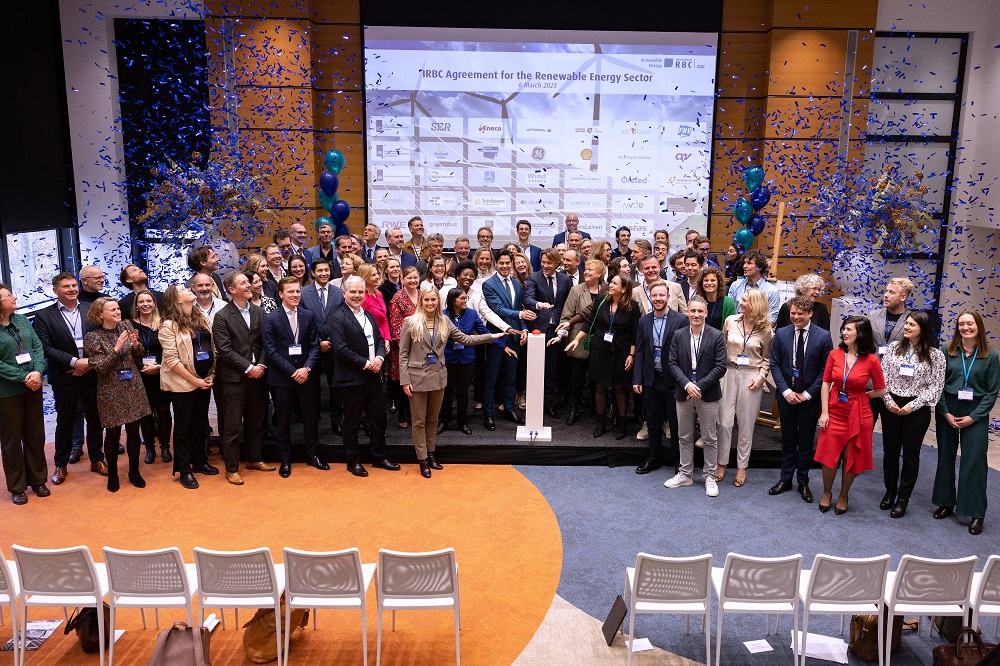Renewable energy sector joins forces for sustainable value chains
Solar and wind energy companies, industry associations, the Dutch government, knowledge institutions, NGOs and trade unions will jointly commit themselves to making international value chains more sustainable. The parties have made agreements in the field of international responsible business (international RBC) in the new International RBC Agreement for the Renewable Energy Sector, which was signed today. The aim of the agreement is to jointly tackle and prevent risks in the field of human rights violations and environmental damage through cooperation.
 © Dirk Hol
© Dirk Hol
Solar and wind energy
The production of solar panels and wind turbines can have adverse consequences for people, the environment and biodiversity. For example, companies can be faced with problems such as deforestation and the loss of natural habitats for animals. Human rights violations, such as forced and child labour, lack of freedom of association, unsafe working conditions and exploitation of the rights of local communities can also occur in the value chains of solar and wind energy. These value chains are complex and lack transparency, which makes it difficult for an individual company to address such risks by themselves. Various international companies from the solar and wind energy sector have therefore joined the Agreement. They want to achieve a positive impact through cooperation.International guidelines and future legislation
The Agreement has an implementation phase of five years and is signed by a broad coalition. By participating, companies commit to applying international guidelines from the OECD and the UN in all their activities. This also prepares them for future international RBC legislation. The collaboration is supported by the ministries of Foreign Affairs and Economic Affairs and Climate Policy, industry associations, financial institutions and interest groups. The participating knowledge institutions, NGOs, trade unions and the Dutch Social and Economic Council (SER) will support companies with their knowledge and expertise in the application of international RBC.Cooperation
In the coming years, the parties will focus on mapping the value chains of individual companies and associated risks. In addition, practical experiences are shared and collective projects are started to implement improvements. The participating organisations are jointly committed to increasing awareness of the importance of sustainable value chains and getting this topic higher on the social agenda.
An overview of all participants can be found here.
Minister Jetten, Ministry of Economic Affairs and Climate Policy: “Renewable energy from sun and wind has now really come to fruition. With this comes a great responsibility to properly deal with nature, human rights and biodiversity in the supply chain and in the operation. With this Agreement, the affiliated companies can work together to provide a better insight into the points for attention and to take action on them. This is a good first step and I look forward to seeing progress in the future.”
David Molenaar, CEO Siemens Gamesa Renewable Energy BV: “Being part of and supporting the Agreement was a simple decision for all at Siemens Gamesa as we share the same beliefs and aims of ensuring our supply chains maintain the highest possible standards of people welfare.”
Elles van Ark, Managing Director at CNV Internationaal: It is fantastic that the demand for sustainable energy is rising so fast. However, this also means the pressure on the miners in Latin America and Africa increases. They often receive temporary contracts and do heavy and unsafe work for low wages. Due to a lack of trade union freedom, it is difficult to address abuses. Within the Agreement, we are committed to promoting trade union freedom, so that employees throughout the value chain can speak out.”
Elisabeth Stevens, Chief Operations Officer at Sunrock: “Sunrock believes in doing business with respect for the interests of employees, other stakeholders and the natural environment. We are convinced of the need to collaborate through this Agreement as a means to enhance our positive impact.”
Kees Vendrik, Chairperson International RBC Agreement for the Renewable Energy Sector: “The importance of renewable energy for the energy transition is crystal clear. However, the increasing demand for renewable energy in the Netherlands and Europe must not be at the expense of social and ecological conditions elsewhere in the world. That is why I am very pleased that we are signing the International RBC-Agreement for the Renewable Energy Sector today. I look forward to working with all participating parties. Only together can we tackle the problems in the chain and make it more sustainable.”
